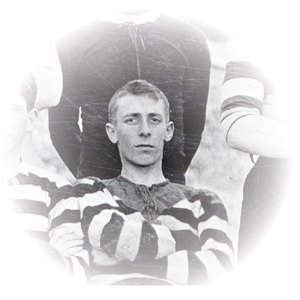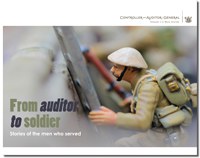Harry Latchford Marbrook
 As a boy, Harry Latchford Marbrook attended Hastings District School. He must have been clever – he was a school prize winner in 1900, and in 1902 the Hawke’s Bay Education Board awarded him a scholarship of £10 9/-.
As a boy, Harry Latchford Marbrook attended Hastings District School. He must have been clever – he was a school prize winner in 1900, and in 1902 the Hawke’s Bay Education Board awarded him a scholarship of £10 9/-.
Harry passed the Junior Civil Service Examination in January 1904, and joined the Audit Department in October 1904, aged 16. By 1914, he had advanced to the position of Audit Examiner, Class VI. He had passed the Senior Civil Service Examination.
In August 1914, aged 26, Harry joined the New Zealand Expeditionary Force and was sent to Samoa on 15 August 1914 as part of the Samoan Advance Party.
In April 1915, Harry returned to New Zealand and was discharged from the New Zealand Expeditionary Force because he was classed as medically unfit.
In February 1916, when his health had recovered, Harry rejoined the New Zealand Expeditionary Force. He was promoted to the rank of Lance Corporal, and in May 1916 he was sent overseas with the First Battalion, Wellington Regiment.
He spent several months in the United Kingdom and was then posted to France. In June 1917, he was treated at a casualty station in France for an injury suffered in training. After two weeks of treatment, he rejoined the First Battalion, “in the field”.
On 13 October 1917, Harry was admitted to a hospital in France, suffering from a gunshot wound to his left arm. In October 1917, the Wellington Regiment was fighting at Passchendaele, and Harry would have been involved in this fighting.
The date of the injury is not stated, but he was probably wounded on 12 October 1917 (it normally took at least a day for wounded soldiers to be admitted to hospital). On 12 October, the New Zealanders suffered 2700 casualties, the highest number of New Zealand casualties on a single day of fighting.
After Harry’s wound was treated, he was discharged from hospital on 10 November 1917.
In January 1918, Harry was sent for training in the use of gas warfare and how to guard against gas attacks.
In March 1918, Harry was promoted to Lance Sergeant. In April, he was promoted to Sergeant. He clearly showed leadership qualities and was sent to the officer training school at Trinity College, Cambridge, England. Harry was promoted to the rank of 2nd Lieutenant in February 1919 and was based at Sling, north of London.
In July 1919, Harry returned to New Zealand. The following month, he was discharged from the New Zealand Expeditionary Force. He was awarded the 1914-15 Star, the British War Medal, and the Victory Medal.
Harry rejoined the Audit Department and took up the position of Audit Inspector, Class V, at Wanganui.
One of the entities he audited was the Patea Rabbit Board. In 1925, he gave evidence in Court against the secretary of the Patea Rabbit Board. His audit had found that the secretary was retaining rate money for his own use. The secretary was found guilty.
Harry rose to the position of Audit Inspector, Auckland. He retired from the Audit Department in 1947.
Harry died on 15 June 1963.

